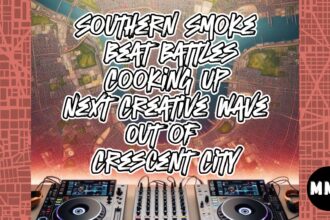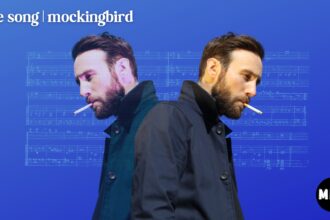My entire life is wrapped up in music. When I’m not playing music, I’m teaching music. If I’m not teaching, I’m learning someone’s music…or writing music…or talking about music…I can barely separate who I am outside of how music defines my everyday life.
Music fills my heart and soul with unadulterated joy unlike almost nothing else. However, finding my identity as a musician has not been a smooth process. I’ve had many points in my journey where I have been confused about who I was or what music meant to me, and equally doubtful about my ambitions and goals.
I grew up in the Midwest and was raised on 70s rock. I remember being woken up in the morning by Rush blaring on the new CD playing-stereo and spending the weekends listening to Pink Floyd and Roger Waters. I loved this music when I was young. I had no idea what the songs were about, but I would let the sounds of King Crimson wash over my tiny soul.
When I reflect on my Black Sabbath-permeated childhood, I’m not really sure how I found classical music. Maybe it was the Carmina Burana CD my mom would play now and then, or how my brothers’ video games were somehow laden with beautifully arranged midi-files that came to life when I Napstered orchestral versions of my favorite tracks. In any case, upon my first listen to a sprawling arpeggiated piano I was hooked.
I tried learning the piano. I begrudgingly went to piano lessons to plunk out “Mary Had a Little Lamb.” I refused to practice but resented the fact that I couldn’t immediately whip out a Beethoven sonata. When the Grand Rapids Symphony had its instrument trial day in fourth grade, I was steered toward the wind instruments as I came from a band family. In my desire to be special and different, I chose the foreigner––a stringed instrument, the violin. I was thrilled with my clearly brave choice.
Fast forward to middle school, where I was surrounded by thirty other violinists who were not only just as special and brave as I was, but were also better than me. Following a particularly difficult “Frosty the Snowman” playing test, tragedy struck and I was moved to the second violin section.
Distraught and with the whole world obviously against me, I spotted the two lonely bassists hanging out in the back of the class. No fuss. Just two chill guys and their basses. My seventh-grade self was drawn to how cool––yet cumbersome and different––the double bass was. My teacher agreed to let me try it if I came in every morning before school to practice, and somehow I took to it.
I didn’t have to be the star. I didn’t have to be heard as much as my other string-player brethren. I could just hold down a fat quarter note and steer without anyone knowing; I could be the special spice in the orchestra that people didn’t even know they would miss. I’ve been in love ever since.
The start of a beautiful friendship–middle school orchestra.
I decided to study music in college. I remember watching the Grand Rapids Symphony perform the “New World Symphony” in high school and being so moved that I just couldn’t let it go. When I listened to classical music, I felt more connected to my spirit. Nothing compared to performing in a symphony. Breathing the singular sound from the back of the orchestra, being wrapped up in the actual creation of harmony, and hanging on every dynamic lift and fall was euphoric.
Then came graduate school.
I entered my master’s degree feeling accomplished, which quickly shifted to feeling out of place. I went to a small college and didn’t realize exactly what else was out there. I was behind others my age, at least in the classical game.
I bent over backward trying to catch up; I’ve never spent so much time alone with my instrument, destroying my body to get myself in shape. I would dream about being trapped in a prison of notes I recognized from particularly difficult sheet music. I would twitch and play sonatas and concertos in my sleep, waking up with swollen fingers after hours of isolation in a practice room. My whole self-worth was wrapped up in my performance as a bassist, and even one out-of-tune note was completely devastating.
I finished grad school feeling traumatized and with a newfound identity crisis. I hated classical music. I hated how regimented it was, how everything had to be so planned and perfect. It no longer felt organic. I didn’t touch my bass for months. I didn’t know who I was or what I wanted from music anymore. I was envious of my peers who still drew so much artistic expression from studying classical music as I considered quitting music altogether.
However, there was a saving grace. One day, as I waited for the elevator to move my mammoth-sized instrument up to the fifth floor for a rousing four-hour practice session, I found a flyer on the wall: a singer-songwriter was looking for musicians to join his band.
I called him up on a whim and joined my first band, which I can best describe as indie-folk-inspired cowboy blues. I had played in jazz bands before, but this was my first true experience having so much musical freedom. Literally nothing was written out and put in front of me. It was both terrifying and exciting. I had to intuit my part and listen closely enough to everyone around me to figure out exactly how I fit in.
I started off mostly playing with folk and bluegrass bands. Technically speaking, my parts were simple; I just had to keep the beat and play the root. I played with a lot of Americana bands and got a better sense of song structure and hearing harmonic patterns. I then began singing harmonies and even leading songs, which is something I never did publicly before playing with bands. That required me to learn to sing and play at the same time, which still feels a bit like pulling my brain in two different directions.
Transitioning out of the classical world came with its challenges. I could play my instrument, but I didn’t always understand my role or the style. I was clunky, and I didn’t have a great ear for chord changes (I still have to work on this all the time). I didn’t understand how to practice non-classical music, and I didn’t have a safety net of notes telling me what to do. I had to step back and listen.
Most of all, I’d always be terrified of making a mistake. I’d be thrown a solo from time to time and freeze with fear; what if I played a wrong note? Would everyone think I’m stupid and never want to play with me again? I could barely keep the beat when I first started taking solos.
However, having now been forced to solo by many friends, I’ve made a lot of mistakes and played a lot of wrong notes yet have never once been asked to leave. I’m still working on self-confidence and I still hear a nagging part of my brain saying “you’re embarrassing.” But, over the years, I’ve learned to welcome and enjoy the process as much as the performance.
The more gigs I play the more comfortable I get introducing myself to more musicians and having the confidence to play more styles. Music rooted in the blues or soul helped me dig more into the “feel,” whereas funk and jazz were more rhythmically and harmonically complex.
I have more and more identified myself as a rhythm section instrumentalist. Identifying with that role has helped me explore groove and stop being so consumed with how much I play, but rather what I play. And after years of idolizing songwriters and firmly labeling myself “only a bass player,” I’m finally starting to write my own songs.

Throughout this experience, I’ve felt more and more myself again. I have found other musicians I respect and love to play with, and I feel myself at home creating the experience with other people in real-time. I may not be playing sweeping arpeggios and ripping out the baddest Mozartian spiccato, but I get to jam. I get to create the music I feel inside.
What gives me the greatest sense of freedom is how I’ve embraced my instrument more than ever. While my past self would have turned my nose up at something like a simple bluegrass bass line, I now relish in it. I love the unique role I get to play in every band and what it means to be the bass player. Playing outside of the classical sphere has allowed me to get back in touch with why I fell in love with the bass in the first place.
All of this being said, I would do classical music, and the musicians who play it, a disservice to boil it down to only playing notes and rhythms on a page. Being a classical musician taught me how to be expressive and passionate, and it taught me how to make notes become music. It brought me a sense of wonder and a curiosity for how sound could come together to make something greater than the sum of its parts.
Classical music is vivid and colorful, simple or complex, beautiful or intense, and it can be interpretive and dramatic. It wouldn’t be art if it wasn’t, and people wouldn’t hear beauty or pain or anger or any emotion if it hadn’t both been written and performed from an expressive place.
This translates to all styles of music. Whatever the vibe, mood, or style being put forth, it needs to be picked up by the people portraying it, and it is up to the musicians to make it come alive through listening, responding, and creating. And now, nothing feels better to me than playing the bass and creating music with other people again.
It’s strange to realize I feel somewhat removed from classical music at this point. Admittedly, there’s a part of me that feels like a failure for turning my back on it. While I didn’t always find great joy in sitting in a room by myself and playing Bach cello suites until my fingers were bruised, it feels a bit like a breakup. It was an important part of my life and it will always be my foundation, but I acknowledge that I’ve lost some of my chops.
Nevertheless, I know all those years sneak their way into my playing, and I wouldn’t be able to do anything I do musically without that influence. I can say with certainty that I’ll never really let it go, and as I get further from it, I miss it. There’s a part of me that still wants to practice excerpts and audition for a symphony. I haven’t ruled this option out of my life. From a creative perspective, I know I incorporate classical influences in music I play, write, and arrange. For now, at least, that gives me a sense of fulfillment as I reconcile my past and present musical journeys.
When I think about what this all meant, I see a journey toward self-awareness and acceptance. In an attempt to prove myself to the world, I lost what was driving me to do anything in the first place. I got wrapped up in how inadequate I felt and what I thought I had to do, what I thought others expected of me, and who I had to be to “make it.” I convinced myself that if I didn’t go the thousandth mile, I had failed. I couldn’t even see my achievements clearly because they came at the expense of my self-worth. Looking back, I realize the only person who pushed me that hard and told me I wasn’t good enough was me.
Getting back in touch with what actually makes me happy and brings me joy and fulfillment is the true lesson. I still stumble and feel the weight of self-doubt, but I am learning to accept myself for what I really want and what I am able to bring to music. As I stride forward in my 30s, I feel grounded in what I’m doing now and in my sense of creative and musical freedom. I feel like I’ve found a place to rest and think and learn, a place to play what feels right and what feels good.










